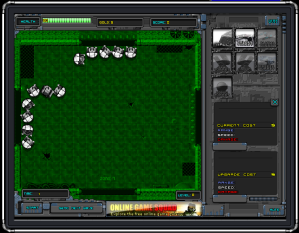Using these criteria, I’ve chosen my top 10 games that I’ve used in the classroom. My classroom, admittedly has usually been in Key Stage 2 (UK NC), so my list is somewhat skewed. But it’s mine.
- Xeno Tactic. Great problem solving game – good for children to help children develop visualisation (they have to see the spaces to create the best maze). Also the last level is impossible – at least I’ve only ever seen screencasts of it being done by cheating.
- Submachine. This series of game is great for developing lateral thinking in problem solving. The first one, Submachine 0, is a great start for children because it’s not too complicated, but after that they do get quite tricky and I have to admit I’ve used the walkthrough on one or two of them.
- Sim City 3000. I got a whole load of these CDs cheap from somewhere and regretted it. Sim City is a great game and the children who used it did get something out of it – but the versions I got where all looked with annoying codes and in an ICT suite of 30 children it was just impractical. I notice it’s possible to download this for free now, so things might be different from a few years ago.
- Civilization 2. Again an old game that I picked up some cheap copies. This worked much better than Sim City though as it was the same version. I remember it fitted quite nicely with the history-based topic work at the time, especially giving children a sense of chronology. Of course it’s a good strategy game too.
- Myst. I used Myst as an interactive whiteboard activity during my weekly team problem solving session. One team would see if they could get further than the previous in their hour. I’ve seen people have used it to inspire writing, but that’s not my own personal bag.
- Baldur’s Gate. I was looking for something to support the teaching of fantasy / sci-fi genre in my literacy lessons and remembered this one. It’s an 11+ so I used it only with the oldest children. What I like is that it’s essentially text-based – so children need to use their reading skills to get anywhere in the game. It also prompted some great writing as it’s set in a very rich world.
- Football Manager 2006. It’s a bit out of date (obviously), but I’ve used this game to run a club in dinner times. It’s a highly numbers based game – all the players are rated on scores out of 20, and there’s lots of large numbers transferring players from team to team. Strangely only boys joined the club.
- Atomic Cannon. This is one of those games where you set an angle and a power and shoot the missile at the enemy tanks. I remember playing a game like this on the BBC Micro when I was about 9. This one works on PC or Mac (and now I notice some mobile devices) and is great to teach children about an understanding of angle.
- Schoolsfl.com. OK, this isn’t quite a game. It’s the Fantasy Football League for schools where each player chooses their own team of Premiership footballers. They are given points after each round of games and prizes each month then follow. There are free versions that exist, but I’ve found that the £3.50 you pay for each team is worth it.
- Cbeebies. As I said, I’m no early years expert, but my own children have loved the Cbeebies website – loads of games and things to do.



